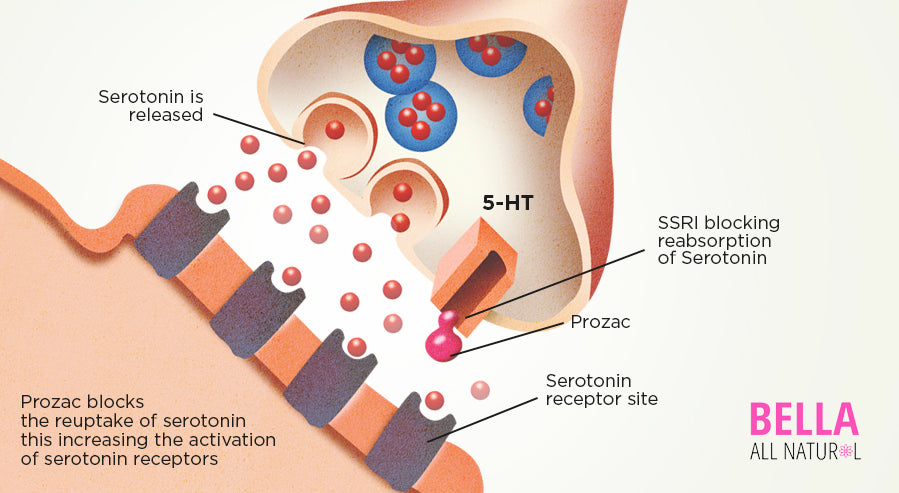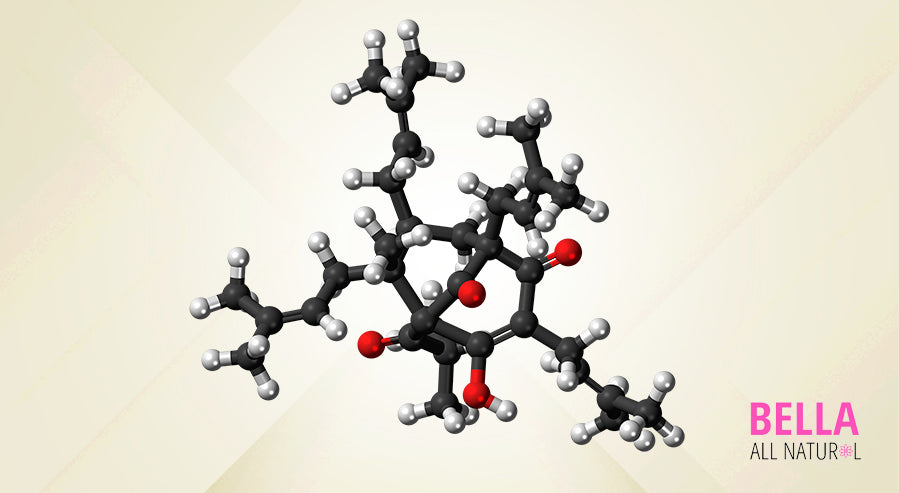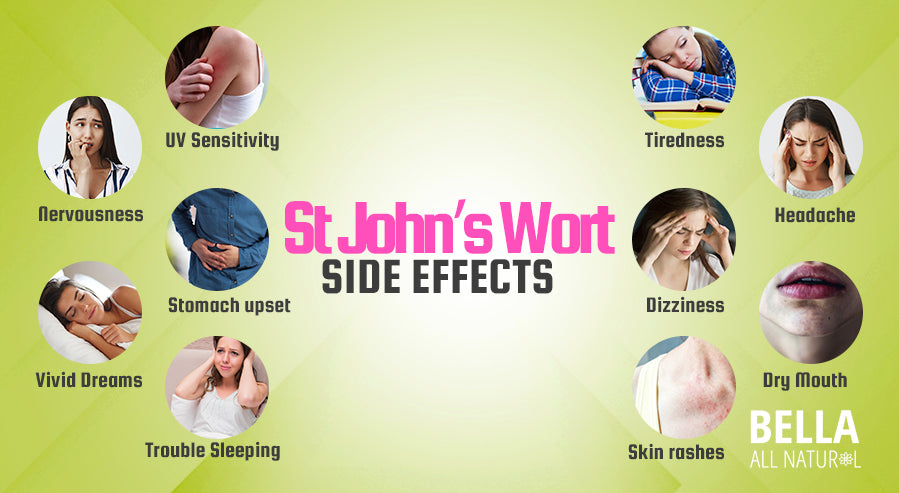

In the world of mood-altering substances, there are a huge array of different options. Some of them are extremely potent and dangerous, mostly scheduled and regulated or illegal drugs. Some of them are potent pharmaceuticals. Some of them are actually found in nature, and while their effects aren't as pronounced as isolated, pure pharmaceuticals, they can still have a noteworthy impact.
We live in a difficult era. The pandemic has put all of us on edge, our lives upturned, and the stresses of daily life compounded. It's no wonder that people are seeking out any treatment and supplement they can find to bolster their mood.
Two such substances are St John's Wort and 5HTP. What are they, how do they work, and which is better? Let's dig in.
What is 5-HTP?
While the name 5-HTP might seem like a scary chemical, it's really not. 5-HTP is a common chemical in the body, and you probably are more familiar with it by a different name: Tryptophan. More specifically, it is known as 5-Hydroxytryptophan or Oxitriptan. It's an amino acid, a chemical precursor used by the body to produce other chemicals, and is an intermediate chemical used in the production of serotonin.

5-HTP is also a byproduct of your body digesting and utilizing the precursor L-tryptophan, which can be found in a variety of different foods and supplements. When you see it commercially, though, it's usually an extract of a specific plant, called the Griffonia Simplicfolia.
Serotonin is a powerful neurotransmitter used for a wide range of different cognitive and mood functions in the brain. It's responsible, in whole or in part, for everything from mood, cognition, learning, memory, vasoconstriction, and even the vomiting response. It's even a key component of your brain's reward center, making you feel happiness and pleasure when good things happen.
Despite being a neurotransmitter in the brain, the majority of the serotonin in the body is produced and stored in the gastrointestinal tract and activates your brain through the Gut-Brain Axis.
How Does 5-HTP Work?
In order to understand how 5-HTP works, you should understand how serotonin works. When your body needs it, serotonin is used as a neurotransmitter, passing messages from one part of your body to another or to your brain. When it's done with its message delivery job, it's taken back up by the bloodstream and either reused or decomposed into component parts for other uses.
Many mood disorders, including anxiety and depression, are often issues with serotonin. They may be caused by serotonin not staying in your bloodstream or your brain enough, depriving the receptors of what they expect. You end up lacking happiness responses, having a sour mood, and suffering from more stress more often.
Pharmaceutical medications, largely anti-depressants and anti-anxiety medications, are part of a class called SSRIs. SSRIs are Selective Serotonin Reuptake Inhibitors. Essentially, they lay in wait, and they trap serotonin in with the receptors, giving you more serotonin responses before the serotonin is taken back up and broken down. Another class, SNRIs, are Serotonin-Norepinephrine Reuptake Inhibitors. They work the same way, but they target both serotonin and norepinephrine, also known as noradrenaline, the neurotransmitter responsible for some stress and the fight-or-flight response.

This is all a dramatic oversimplification of how these bodily processes work. We're not cellular biologists, after all. We're just paraphrasing from people who are much more educated on these matters.
Where does 5-HTP play into this? Well, it works to create more serotonin in the body. More serotonin means better serotonin responses, and thus less depression, less anxiety, a better mood, more happiness, and an overall better outlook on life.
Drawbacks to 5-HTP
If this is a great treatment for depression and anxiety, why don't we use it all the time? Well, there are a few possible reasons.

First and foremost, we're just not sure how effective it is. There have been quite a few small studies performed over the years into the efficacy of 5-HTP, but very few of them are rigorous. Many of them have flaws, such as:
- Their sample sizes are too small to be scientifically relevant.
- Their experiments aren't properly controlled, so there's no way to tell if they had a real impact.
- The studies are funded exclusively by people selling 5-HTP supplements and aren't properly analyzed.
There's a lot of low-level and anecdotal evidence to support claims that it works, but there have been very few rigorous, controlled studies to determine whether or not that's actually true. Still, it's not a controlled substance and is sold over the counter in a variety of different forms, so it's easy enough to try it to see if it works for you.
One of the more defined problems with 5-HTP is just its short half-life. It doesn't take very long before the body absorbs, processes, and discards it, so it doesn't have a very long effective duration. This might make it a poor supplement simply because its effects wouldn't last long enough to be truly mood-altering.
There are also some side effects. 5-HTP might cause nausea, heartburn, vomiting, indigestion, sexual problems, drowsiness, and muscle problems. There's also the possibility that it might cause a condition known as eosinophilia-myalgia syndrome, though records of this happening may have come from contaminants and not the 5-HTP itself.

If you're diagnosed with depression or anxiety and you're on a drug to treat it, that drug likely also interacts with your serotonin, either the production or the reuptake of the chemical. Taking 5-HTP may interfere with the proper functioning of this medication, so you should always consult your doctor before using it for any length of time or in any high dosage.
What is St John's Wort?
St John's Wort is an herbal remedy. It is the plant known as Perforate St John's Wort, known scientifically as Hypericum perforatum, which is common around the world. It was originally located in the temperate climate bands in Europe and Asia, but was introduced as a wildflower and is now an invasive weed in North America, South America, South Africa, and Australia. In other words, you can find it pretty much anywhere these days.

The herb has been known and used as a remedy for literal millennia, stretching back to the time of antiquity in 30CE. Like many herbal remedies, it has been used to treat just about anything. Seriously, there's a list here. People have used it (ineffectually) to treat everything from ADHD to cancer to migraines to psoriasis to herpes to fibromyalgia to excitability. There's zero evidence it works for any of those.
How Does St John's Wort Work?
The active ingredient in St John's Wort is Hyperforin. Hyperforin is a phytochemical (plant chemical) with a lot of potential effects. Here, let's quote Wikipedia and show you what we usually deal with, and what we explain to you in plain English:
"Hyperforin may be a constituent responsible for the antidepressant and anxiolytic properties of the extracts of St. John's wort. In vitro, it acted as a reuptake inhibitor of monoamines (MRI), including serotonin, norepinephrine, dopamine, and GABA and glutamate, with IC50 values of 0.05-0.10 μg/mL for all compounds, with the exception of glutamate, which is in the 0.5 μg/mL range.[18] In other laboratory studies, hyperforin induced cytochrome P450 enzymes CYP3A4 and CYP2C9 by binding to and activating the pregnane X receptor."

In other words, it's similar to 5-HTP in terms of effect, except it's not as selective. Instead of focusing on serotonin, it deals with a whole lot of different neurotransmitters and monoamines, including norepinephrine and dopamine.
So, essentially, St John's Wort works in the same way as 5-HTP, but more broadly, affecting more neurotransmitters in a stronger way. This can be good because it has a stronger effect, but it can also be bad.
Drawbacks to St John's Wort
One of the biggest drawbacks to St John's Wort is that its effects are almost pharmaceutical-level strong. Unlike pharmaceuticals, however, it's unregulated, unrefined, and potentially impure. This means from dose to dose, it might not have the same effects, and that can cause a range of different issues like mood swings.
St John's Wort is also relatively short-lasting, similar to 5-HTP. It may be effective in the short term but might not work as a long-term solution to mood disorders or depression.

St John's Wort also has a lot of potential side effects. These include:
- UV Sensitivity. Taking St John's Wort in large doses over time can cause excess light sensitivity, which means you're much more susceptible to sunburns and skin disorders.
- Trouble Sleeping. Insomnia is a common side effect of this supplement.
- Vivid Dreams. Some people might not consider this a negative side effect, but it's a tangible one.
- Nervousness, trouble sitting still, and irritability. Mood disorders are vastly complicated, and anything that messes with neurotransmitters can have wide-ranging effects if it's even a little out of balance.
- Stomach upset.
- Tiredness. This goes hand-in-hand with insomnia.
- Dizziness.
- Headache.
- Skin rashes.
- Dry Mouth.
Now, obviously, there's no guarantee you'll experience side effects, and if you do, you certainly aren't likely to have everything on the list. Still, it's a lot of possible ways for the supplement to go wrong.
Perhaps more dangerous than all of the above is that St John's Wort can interfere with a wide range of medications.
- Anything that interacts with serotonin. Most depression medications, SSRIs, SNRIs, and other medications can interact negatively with St John's Wort.
- Anything with sun sensitivity as a side effect. In particular, the cancer medication aminolevulinic acid causes sun sensitivity that can be exacerbated by St John's Wort.
- Estrogen. Estrogen supplements, either used for gender transitioning or for birth control, are processed by the body and used. St John's Wort increases the rate the body breaks down estrogen, and thus decreases the efficacy of the estrogen for its stated purpose.
There are dozens of medications that have identified reactions to St John's Wort, generally all the same reaction: breaking down faster and becoming less effective for it. You can read the full list here.
Which is Better for Your Happiness?
The answer to this final question is a very complicated one, and it depends on your personal situation.
Essentially, you have to answer three questions.
- What is your mood issue? Do you have minor mood imbalances, do you have major anxiety and depression, or something in between?
- What is your current treatment plan? Are you on existing medications?
- What is your goal?
For people who have minor mood disorders and who are not currently receiving treatment for those issues, we recommend sticking with 5HTP. The effect is relatively minor, but it's also relatively safe.
For people with middling or major disorders but who are not currently receiving treatment for them, you can try St John's Wort. We'd recommend it as part of a balanced supplement.

Be sure not to take too much of it, and always make sure you're not taking a medication that could be interfered with.
For people who are currently receiving treatment via medication for anxiety, depression, cancer, or any of a wide variety of other health issues, we strongly urge you to consult your doctor. St John's Wort might be a way to enhance your mood, but you definitely don't want to take it if it will interfere with your other treatment.
So, to sum up, you can put it this way: St John's Wort is much stronger, but it's a double-edged sword. It has the potential to help you quite a bit – at least for mood issues – but it also interferes with a lot of other treatments. Use it, but use it carefully.
Meanwhile, 5-HTP is much safer to use but has a much shorter and less pronounced effect when you take it. Feel free to do so, but be aware that it might not work for very long, and it might not be very strong when it works. As always, though, every person reacts differently to supplements, so it may be more or less effective for you than for us or for others, you know. And, as always, consult your doctor if you experience any major side effects of either supplement.



